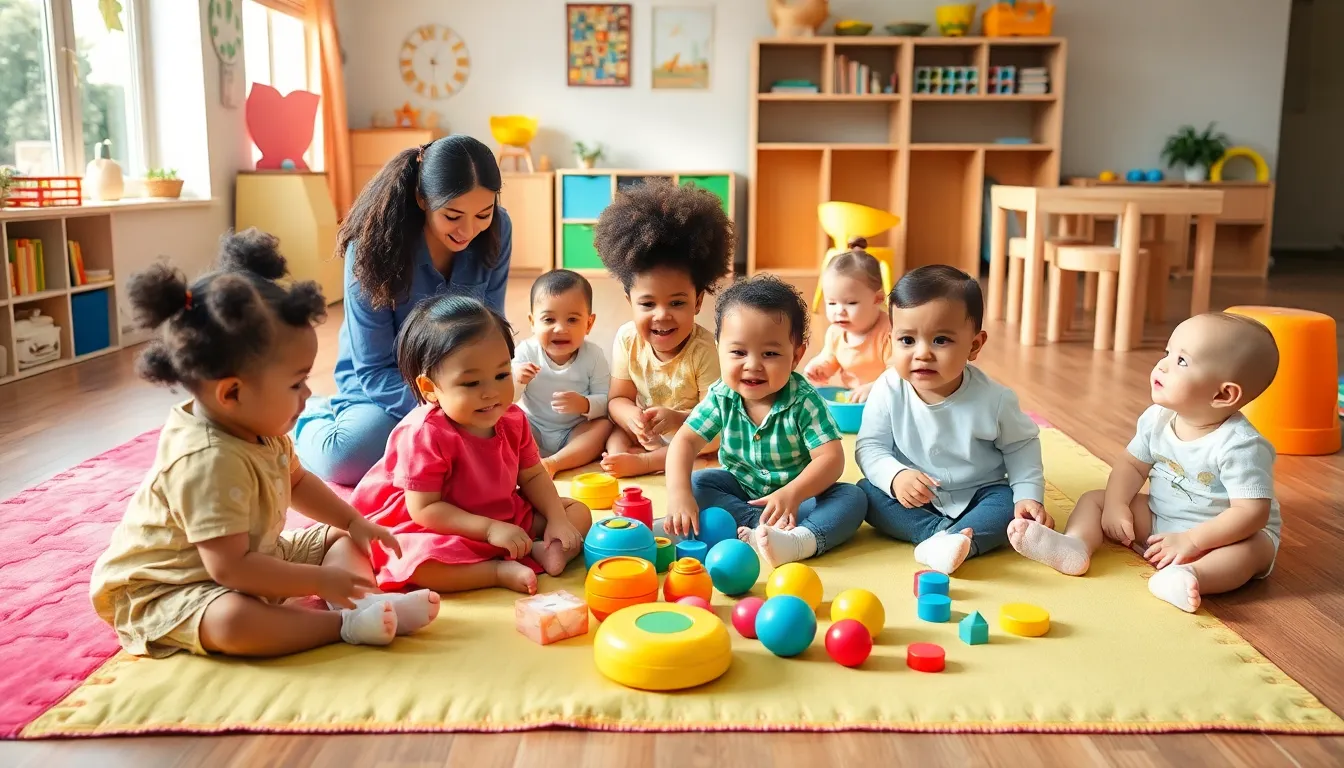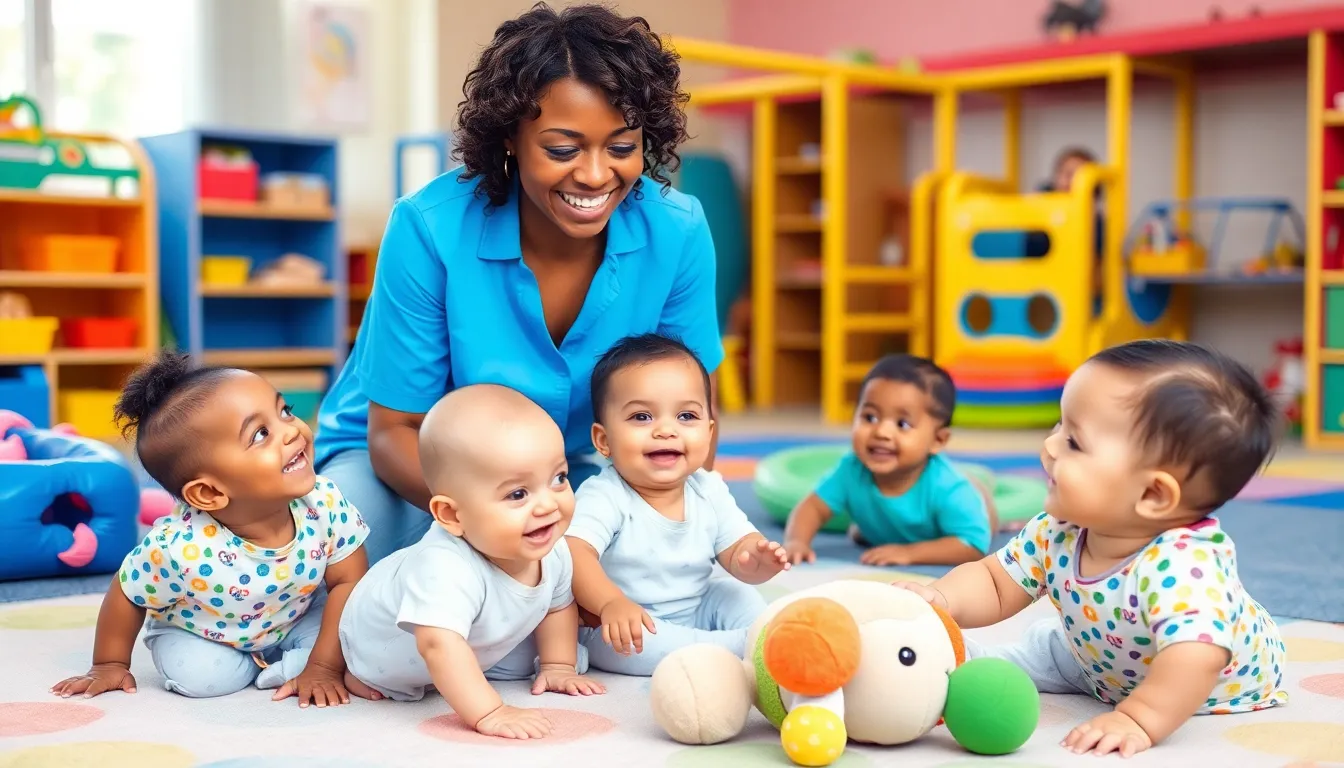Choosing the right daycare for babies can feel like navigating a minefield of options. Parents want a place that’s safe, nurturing, and maybe even a little fun—because let’s face it, the last thing anyone wants is a baby who’s bored. After all, those tiny humans have a lot of energy to burn, and they need a space where they can wiggle, giggle, and explore.
Table of Contents
ToggleWhat Is Daycare For Babies?
Daycare for babies refers to structured care provided for infants and toddlers during the day. This care typically takes place in a designated facility where trained staff supervises and nurtures young children. Many daycare centers focus on creating a safe environment that fosters growth and development through play.
Services provided by daycare facilities ensure that children engage in age-appropriate activities. Activities may include sensory play, music, and movement. Caregivers often design these programs to stimulate cognitive and motor skills while also prioritizing socialization among peers.
Facilities typically adhere to guidelines set by state licensing agencies. Regulations often cover staff-to-child ratios, safety measures, and health standards. Such compliance is crucial in maintaining high-quality care, ensuring a safe setting for babies.
Parents often seek out daycare for various reasons. Many need support while balancing work and family responsibilities. Some parents view daycare as an opportunity for their babies to develop social skills early on, providing a foundation for future learning experiences.
Daycare services often vary widely in structure and philosophy. Some centers adopt a play-based approach, while others may utilize more formal educational curricula. Selecting the appropriate type of daycare for babies involves considering individual family needs and values.
Ultimately, daycare for babies serves as a significant support system for families, providing not only supervision but also promoting inclusive social experiences for young children.
Benefits Of Daycare For Babies

Daycare provides numerous benefits for babies, promoting both social and developmental growth. Parents often recognize how these advantages contribute to their child’s early experiences.
Social Interaction
Social interaction is crucial for babies, as it fosters the development of communication and interpersonal skills. Engaging with peers and caregivers helps infants learn to express emotions, understand social cues, and form relationships. Babies frequently participate in group activities, such as storytime and play, allowing them to share toys and cooperate with others. Exposure to different personalities encourages adaptability and empathy, vital traits for future social experiences. Caregivers also facilitate interactions, guiding babies through conflicts and encouraging positive communication.
Developmental Growth
Developmental growth occurs in multiple areas during daycare. Structured environments expose babies to age-appropriate activities that stimulate cognitive and motor skills. Sensory play, music, and movement contribute to brain development and body coordination. By participating in various activities, babies often advance in problem-solving abilities and creativity. Each interaction with toys or peers offers new learning opportunities, encouraging curiosity and exploration.
Caregiver support and enrichment create a foundation for well-rounded development, ensuring babies achieve essential milestones. Thus, daycare serves as a significant catalyst for growth during those formative years.
Types Of Daycare Options
Numerous daycare options exist for parents to consider. Each option presents distinct features and advantages that cater to varying needs.
In-Home Daycare
In-home daycare operates within a caregiver’s residence. This setup often provides a more intimate atmosphere, allowing babies to receive personalized attention. Caregivers typically care for a limited number of children, maintaining lower staff-to-child ratios. Familiar home environments often reduce anxiety for babies, promoting comfort and security. Parents appreciate the flexible schedules that in-home daycare often offers, accommodating unique work hours. Caregivers often include nurturing activities like reading, arts and crafts, and outdoor play. It’s essential for parents to evaluate the caregiver’s qualifications and adherence to safety standards before making a selection.
Center-Based Daycare
Center-based daycare offers structured programs for a larger number of children in dedicated facilities. These centers employ trained staff who specialize in early childhood education. A diverse array of activities, including sensory play and group games, helps promote cognitive, social, and motor skill development. Parents value the consistent hours and reliability these centers typically provide. State regulations often ensure that center-based daycares adhere to health and safety standards. Interaction with peers is amplified through group settings, fostering crucial social skills among babies. Families should research various centers to find those that align with their educational philosophy and values.
Choosing The Right Daycare For Your Baby
Selecting the ideal daycare for a baby involves consideration of various important factors. Parents should gather essential information from prospective providers to ensure a suitable environment.
Questions To Ask Providers
Inquire about staff qualifications and training. Understanding caregiver experience aids in evaluating their ability to support a baby’s development. Ask about daily routines, including the balance of playtime and structured activities. Find out how they handle emergencies and the procedures in place for safety. Discuss the staff-to-child ratio, as a lower ratio usually means more personalized attention. Clarify communication methods used to keep parents informed about their child’s progress. Understand the facility’s policies on nutrition, rest, and discipline. Knowing these details helps parents make informed decisions.
Evaluating Facilities
Examine cleanliness and organization upon visiting a daycare. A tidy environment implies attention to hygiene and child safety. Observe the types of play areas available for babies. Indoor and outdoor spaces should encourage exploration and engagement. Check for age-appropriate toys and materials that stimulate learning. Assess how staff interacts with the children, noting warmth and responsiveness. Licensing and accreditation details indicate the facility meets established standards. Overall, ensure a welcoming atmosphere that feels right for both the baby and the parents.
Choosing the right daycare for a baby is a critical decision that can significantly impact their early development. Parents should prioritize environments that promote safety, nurturing, and opportunities for social interaction. By carefully evaluating different daycare options and considering factors like staff qualifications and facility cleanliness, parents can find a setting that aligns with their values and meets their child’s needs. A well-chosen daycare not only supports a baby’s growth but also fosters essential skills that lay the groundwork for future learning and relationships. Ultimately, investing time in this decision can lead to a positive experience for both the child and the family.




